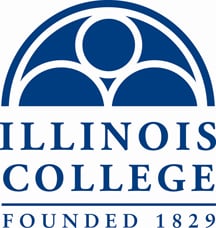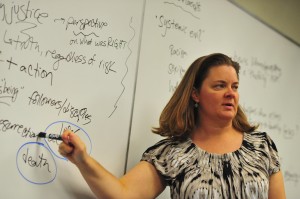 On Saturday, the Illinois College Board of Trustees voted to promote me to Professor of Religion. For those of you not familiar with the academic hamster wheel and ladder, this is the highest ‘regular’ rank that a professor can achieve. Full Professor. It’s what comes after lecturer, instructor, assistant professor, and associate professor. Beyond this, it’s on to endowed and named chairs, or a shift to administrative leadership like dean, provost, or president.
On Saturday, the Illinois College Board of Trustees voted to promote me to Professor of Religion. For those of you not familiar with the academic hamster wheel and ladder, this is the highest ‘regular’ rank that a professor can achieve. Full Professor. It’s what comes after lecturer, instructor, assistant professor, and associate professor. Beyond this, it’s on to endowed and named chairs, or a shift to administrative leadership like dean, provost, or president.
And so I’m prompted to reflect on more than a few things. Primarily, I am thinking about the persistent gender gap in academia and how systemic privileges are built into this world.
In 2011, John Curtis, Director of Research and Public Policy for the American Association of University Professors, reported on persistent gender inequity in academia. In short, while women comprise 57% of college and university students, they are only 42% of full-time faculty:
Overall, women are less likely than men to be employed as full-time tenure-track faculty members, less likely to hold tenured or full professor positions, and comprise less than a quarter of all college and university presidents. Women in full-time faculty positions earn only about 80 percent of what men earn, and since women are also overrepresented in low-paying part-time faculty positions, the gender gap in earnings is actually even larger than that.
The fact is also that the number of women in full time faculty positions has grown slower than expected after Title IX in 1972 dramatically increased women’s access to higher education and their ability to earn graduate degrees normally required of faculty work. Curtis notes the common response that “it’ll just take some time” for women to gain parity with men in academic employment. A study of hiring trends and employment patterns reveals that this is not the case.
…at the rate of progress found at this university throughout the 1990s, it would take 57 years for women to make up 50 percent of the full-time faculty.
Additionally, when you go up the ranks, there are fewer and fewer women. 28% of those at the full professor rank are women. As of July 1, this will include me. Curtis notes:
At only 28 percent of all full professor appointments, women are still outnumbered more than two to one in the most senior rank. And recent reports from the Modern Language Association (2009) and University of Massachusetts Amherst researchers (Misra, et al., 2011) confirm that women are less likely to be promoted than men, and when they are promoted, the process takes longer.
I’m telling you this context not so that you’ll realize how fabulous I am, because really, I’m not.
 I want to tell the truth about what (in addition to hard work over many years) made it possible for me to attain this rank at the ripe old age of 41:
I want to tell the truth about what (in addition to hard work over many years) made it possible for me to attain this rank at the ripe old age of 41:
I’m white.
I teach at a small liberal arts college whose mission is educating undergraduate students.
I teach religion and gender & women’s studies.
I’m hetero-married.
We don’t have kids.
My spouse has a work life that enabled him to follow me to this small town.
Every single one of these things is a more meaningful indicator on who is more or less likely to achieve tenure and be promoted up the faculty ranks in American higher education.
My whiteness matters, because the race gap is much bigger than the gender gap. For example, 5% of full time faculty nationwide are black, including those at historically black colleges and universities.
My childfree-hetero-marriage matters, because marriage and having children slows down women’s careers and helps men’s. Pressures on and discrimination against gay, lesbian, and transgendered faculty abounds.
My husband’s portability matters, because we live in a patriarchal culture that frowns upon men who move for a woman’s job, and the fact that my husband did it anyway means that my career advanced.
My field of teaching and study matters, because women who teach in the STEM fields (science, technology, engineering, math) are less likely to achieve tenure and promotion.
My small undergraduate liberal arts college context matters, because women are more underrepresented at doctoral degree granting instutitions.
Sure, hard work matters, but all of these other things matter too … maybe more than they should. I want to tell the truth about privilege, and how it operates, so that it doesn’t remain invisible and we don’t continue to be oblivious to it.  In an earlier post, I considered Peggy McIntosh’s widely read, quoted, and used 1988 essay on “White Privilege.” It built on her feminist awareness of how male privilege plays out, and moved on to address and name white privilege. It has since been adapted to address other systemic privileges like heterosexuality, and I suggested that we consider Christian privilege as well. The ways in which I benefit from being part of this norm too is real.
In an earlier post, I considered Peggy McIntosh’s widely read, quoted, and used 1988 essay on “White Privilege.” It built on her feminist awareness of how male privilege plays out, and moved on to address and name white privilege. It has since been adapted to address other systemic privileges like heterosexuality, and I suggested that we consider Christian privilege as well. The ways in which I benefit from being part of this norm too is real.
Because while I have worked hard to earn this promotion, the fact is that a lot of faculty work tirelessly every day and don’t earn tenure, or get promoted, or get published, or get speaking invitations. And it might have nothing to do with whether they earned it or not. It might have a lot more to do with other systemic ways in which identities and behaviors are rewarded and penalized in this culture and in this specific work context.
The more we tell the truth about them, the more accountable for them we all are.












